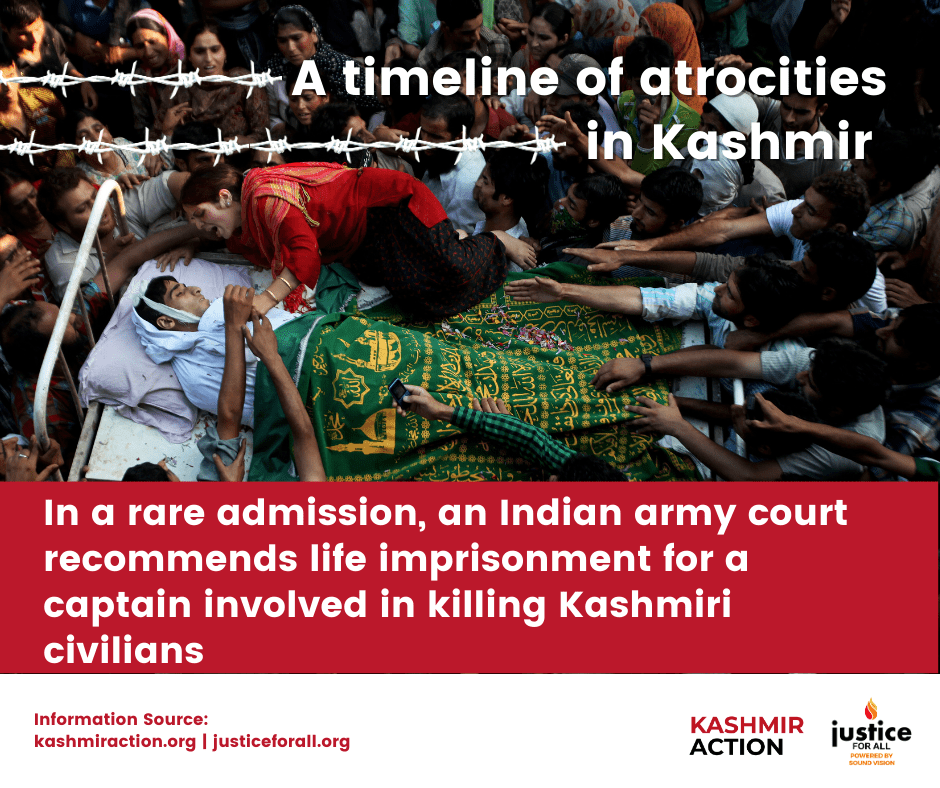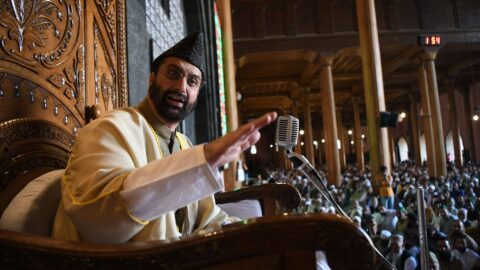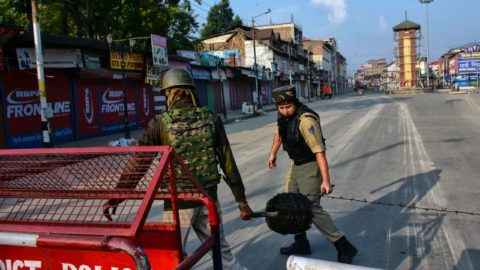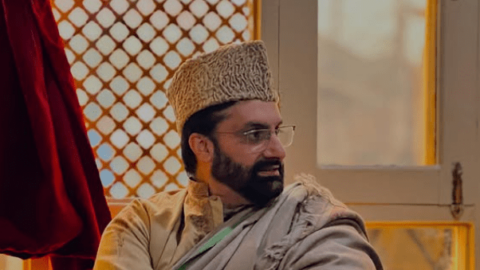On December 27th, Mirwaiz Muhammad Umar Farooq, was barred from leaving his house to lead…
In a rare admission, an Indian army court recommends life imprisonment for a captain involved in killing Kashmiri civilians
On March 6th, an Indian Army court recommended life imprisonment for a captain in relation to the killing of three Kashmiri civilians in a “staged” and “fake” military operation in the Shopian area of south Kashmir in July 2020[2].
Captain Bhoopendra Singh was subjected to court martial after a Court of Inquiry and Summary of Evidence found that troops had “exceeded” powers vested under the Armed Forces (Special Powers) Act (AFSPA), the act has for long provided the members of Indian army in Kashmir with a culture of impunity, allowing them to kill and detain Kashmiris merely on the basis of “suspicion”. The life sentence, however, is subject to confirmation by higher army authorities.
The three men, Imtiyaz Ahmed, Abrar Ahmed and Mohammed Ibrar, belonged to the Rajouri district of Jammu and Kashmir. They were killed in a remote hilly village in Shopian district on July 18, 2020, and then falsely labeled as “terrorists”. It was later found out that they were civilians and had left their homes to earn livelihood for their families.
The AFSPA gives the Indian armed forces wide powers to shoot to kill, arrest on a flimsy pretext, and conduct warrantless searches. With these special powers, Indian soldiers have raped, tortured, “disappeared,” and killed Kashmiris for decades without fear of being held accountable.
Section 7 of AFSPA 1990 prohibits the prosecution of security forces personnel unless the Government of India grants prior permission to prosecute. This has resulted in virtual impunity for security forces against prosecution for any human rights violation. In the nearly three decades that the law has been in force in Jammu and Kashmir, there has not been a single prosecution of armed forces personnel granted by the central government.
The act violates provisions of international human rights law, including the right to life, the right to be protected from arbitrary arrest and detention, and the right to be free from torture and cruel, inhuman, or degrading treatment.
In February 2018, the Union Ministry of Home Affairs informed the Indian Parliament that over the past three decades, the Jammu and Kashmir government had requested the permission of the central government for prosecution of members of the Indian security forces in 50 cases of varying human rights violations. The central government refused to allow prosecution in 47 of these cases, while the decisions surrounding the other 3 cases remained pending as of April 2018.
While the Indian authorities have maintained that any allegations of human rights violations by security forces are justly taken care of by the military justice system, according to the Special Rapporteur on Independence of Judges and Lawyers, military courts do not uphold international fair trial requirements and standards and as a result, are not suitable to undertake trials concerning offenses committed against civilians.
In April 2013, the Supreme Court of India granted security forces the option to oversee the trials of their own personnel. This permission has been used by security forces to their own advantage. For example, In July 2017, the Armed Forces Tribunal suspended the life sentences and granted bail to five Indian Army personnel who had been convicted by an army court-martial on 12 November 2014 for their involvement in the extrajudicial killing of three civilians in one of the districts in Kashmir, Baramulla, in 2010. The killings resulted in civilian protests in Kashmir in the summer of 2010 and the Indian forces killed over 100 of these protesters and injured many more.
The content of the Armed Forces Tribunal’s decision and order to put an end to the life sentences has not been made public and the central authorities have not challenged the Armed Forces Tribunal’s order. This pattern is seen in many other cases as well.
In June 2017, a military court acquitted two soldiers who had been involved in the killing of a 16-year-old Kashmiri, named Zahid Farooq, in 2010. The military had successfully prevented the case from being transferred to the jurisdiction of a civilian court. In 2011, more than 2,000 unmarked graves were found in Kashmir, believed to be of victims of extrajudicial murder by the military forces.
In November 2017, the State Human Rights Commission issued a directive to the state government to launch an investigation into these graves. The directive had previously been issued in 2011 too, but on both the occasions, no action followed.
Keeping in view this history, the current direction by the Indian military court in the case of the Shopian fake encounter will have to be followed keenly, as in the past, such directions have been reversed and the perpetrators set free.





